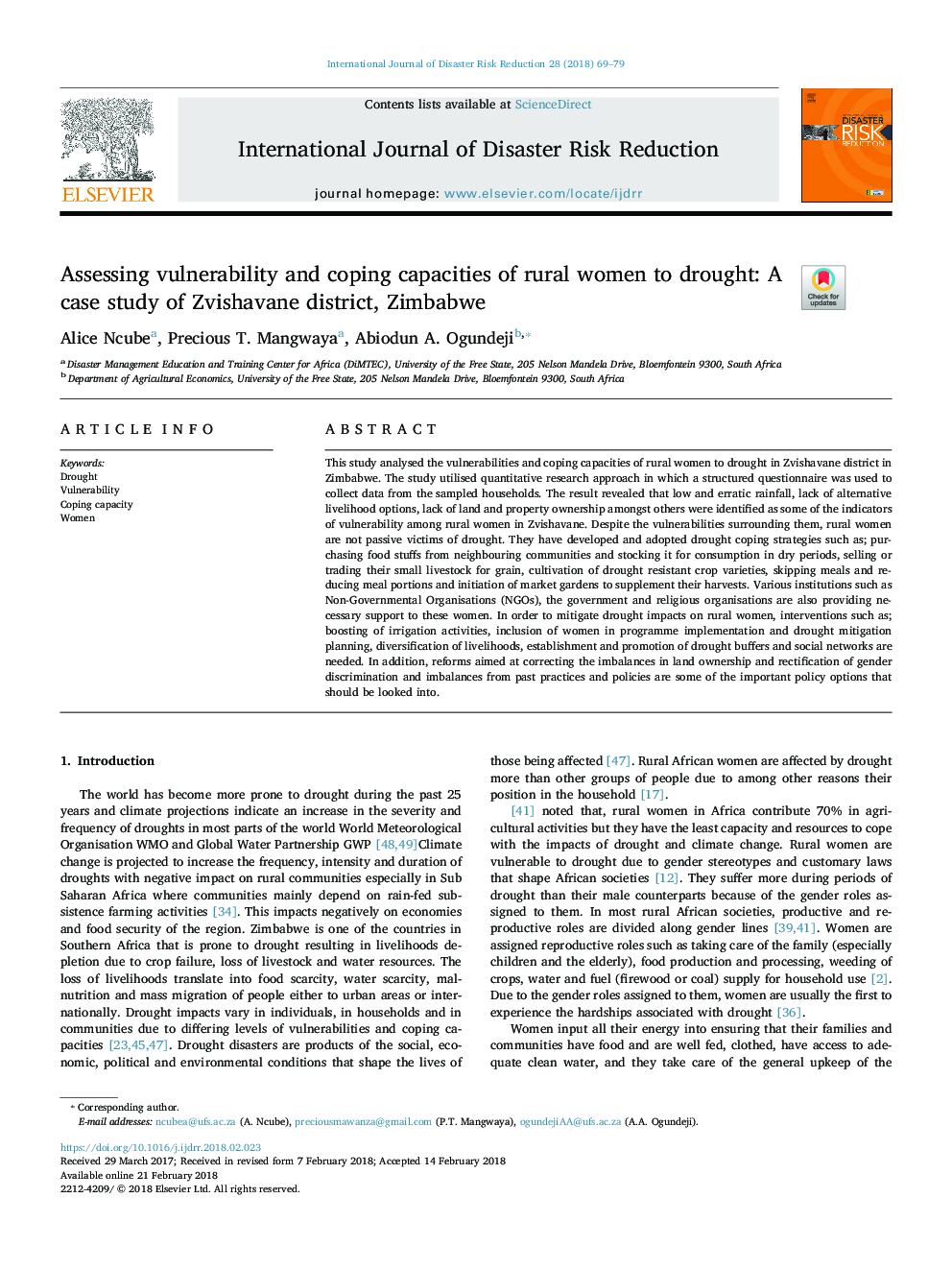| کد مقاله | کد نشریه | سال انتشار | مقاله انگلیسی | نسخه تمام متن |
|---|---|---|---|---|
| 7471462 | 1485142 | 2018 | 11 صفحه PDF | دانلود رایگان |
عنوان انگلیسی مقاله ISI
Assessing vulnerability and coping capacities of rural women to drought: A case study of Zvishavane district, Zimbabwe
ترجمه فارسی عنوان
ارزیابی آسیب پذیری و توانایی های مقابله ای زنان روستایی به خشکسالی: مطالعه موردی منطقه زویاشانه زیمبابوه
دانلود مقاله + سفارش ترجمه
دانلود مقاله ISI انگلیسی
رایگان برای ایرانیان
کلمات کلیدی
خشکی، آسیب پذیری، ظرفیت مقابله، زنان،
ترجمه چکیده
این مطالعه آسیب پذیری و توانایی های مقابله ای زنان روستایی را به خشکسالی در منطقه زویاشانه زیمبابوه تحلیل کرد. این مطالعه از روش تحقیق کمی استفاده کرد که در آن از پرسشنامه ساختاری برای جمع آوری داده ها از خانوارهای نمونه استفاده شد. نتایج نشان داد که بارندگی های کم و ناچیز، کمبود گزینه های معیشت جایگزین، فقدان زمین و مالکیت مالکیت در میان دیگران به عنوان برخی از شاخص های آسیب پذیری در زنان روستایی در زویشوان شناخته شده است. با وجود آسیب پذیری هایی که در اطراف آنها وجود دارد، زنان روستایی قربانیان خشکسالی منفعل نیستند. آنها از استراتژی های مقابله با خشکسالی مانند؛ خرید مواد غذایی از جوامع مجاور و ذخیره آن برای مصرف در دوره خشک، فروش و یا تجارت دام دام خود را برای دانه، کشت انواع تنوع محصول مقاوم در برابر خشکسالی، صرف غذا و کاهش بخش های غذا و شروع باغ های بازار برای تکمیل برداشت خود را. مؤسسات مختلف مانند سازمان های غیر دولتی (سازمان های غیر دولتی)، دولت و سازمان های مذهبی همچنین حمایت لازم را برای این زنان انجام می دهند. به منظور کاهش اثرات خشکسالی بر زنان روستایی، مداخلات مانند؛ تقویت فعالیت های آبیاری، مشارکت زنان در اجرای برنامه و برنامه ریزی برای کاهش خشکسالی، تنوع معیشت، ایجاد و ارتقاء بافر های خشکسالی و شبکه های اجتماعی مورد نیاز است. علاوه بر این، اصلاحات که با هدف اصلاح عدم تعادل در مالکیت زمین و اصلاح تبعیض جنسیتی و عدم تعادل از شیوه ها و سیاست های گذشته، بعضی از گزینه های مهم سیاسی است که باید مورد توجه قرار گیرد.
موضوعات مرتبط
مهندسی و علوم پایه
علوم زمین و سیارات
فیزیک زمین (ژئو فیزیک)
چکیده انگلیسی
This study analysed the vulnerabilities and coping capacities of rural women to drought in Zvishavane district in Zimbabwe. The study utilised quantitative research approach in which a structured questionnaire was used to collect data from the sampled households. The result revealed that low and erratic rainfall, lack of alternative livelihood options, lack of land and property ownership amongst others were identified as some of the indicators of vulnerability among rural women in Zvishavane. Despite the vulnerabilities surrounding them, rural women are not passive victims of drought. They have developed and adopted drought coping strategies such as; purchasing food stuffs from neighbouring communities and stocking it for consumption in dry periods, selling or trading their small livestock for grain, cultivation of drought resistant crop varieties, skipping meals and reducing meal portions and initiation of market gardens to supplement their harvests. Various institutions such as Non-Governmental Organisations (NGOs), the government and religious organisations are also providing necessary support to these women. In order to mitigate drought impacts on rural women, interventions such as; boosting of irrigation activities, inclusion of women in programme implementation and drought mitigation planning, diversification of livelihoods, establishment and promotion of drought buffers and social networks are needed. In addition, reforms aimed at correcting the imbalances in land ownership and rectification of gender discrimination and imbalances from past practices and policies are some of the important policy options that should be looked into.
ناشر
Database: Elsevier - ScienceDirect (ساینس دایرکت)
Journal: International Journal of Disaster Risk Reduction - Volume 28, June 2018, Pages 69-79
Journal: International Journal of Disaster Risk Reduction - Volume 28, June 2018, Pages 69-79
نویسندگان
Alice Ncube, Precious T. Mangwaya, Abiodun A. Ogundeji,
